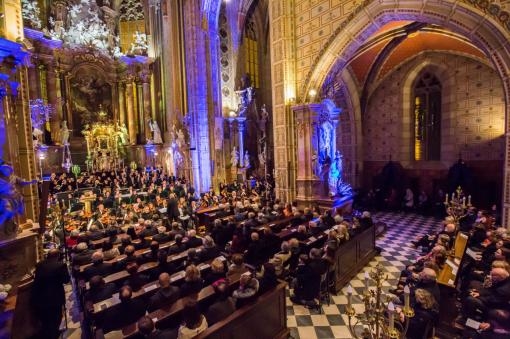Tomorrow, the Brno Philharmonic Orchestra is already looking forward to an extraordinary concert – both in terms of its program and the many ways it can reach the audience. As part of the Mendel 2022 festival, the orchestra will play Janáček’s Glagolitic Mass and, in a world premiere, present a piece that Armenian composer Tigran Mansuryan composed on commission for the Philharmonic and the festival. Mansurjan will be present in person for the first performance of his work entitled Orhnerg – Navapet Bari (Hymn – The Good Captain).
The concert will take place on Friday 22 July at 19:00 in the Old Brno Basilica under the baton of Principal Conductor Dennis Russell Davies. Due to the expected high demand, it will be streamed live on the main stage outside the Basilica, on social media, and also broadcast live on Czech Radio Vltava. “Streaming the concert outdoors is a common thing in the world, and we are one of the first to try it here. We know from experience and feedback that outside listeners always praise the atmosphere a lot, some of them treat the concert like a picnic, taking umbrellas, blankets and wine. Of course, we guarantee top quality sound and image, which we also guarantee here in Brno,” said Matěj Hollan from the Mendel Festival organizing team.
Mansurjan’s Hymn will be performed at the beginning of the concert. “I am proud of the relationships we have with many contemporary world composers. In the case of Tigran Mansurjan, the relationship is really close and intense. Like us, he recalls the Czech premiere of the Requiem, which the audience at the Besední dům rewarded with two nights of incredible ovations. That’s why he gladly agreed to this commission,” said Marie Kučerová, director of the Brno Philharmonic.
Mansurjan wrote his hymn knowing that it would be sung in the basilica he visited, whose atmosphere had a strong impact on him. “I love Janáček’s work, all of it. It is a great honor for me that the Hymn will be heard in the place where he played the organ. Likewise, it is a great honor to pay tribute to Mendel. I am impressed by his life and work – his commitment to faith and science, his tenacity. Before I began to write, I immersed myself in his biography... and it was clear to me that before entering the realms of compositional art, I had to go to the depths of faith, to the depths of the human soul, the essence where all individuality is hidden – and try to express it musically. Mankind has always known that a child looks like one parent or both, but until Mendel’s time it was never a topic for teaching in schools, for science,” Mansurjan said.
When composing, he took into account that his Hymn would be performed before the Glagolitic Mass. “It is powerful, full of dynamics. That’s why I went in the opposite direction, the quiet, introspective direction. I chose two hymns by Armenian clerics from the 5th century and set them to music for soloists, choir and small orchestra. I chose a form that is modest, ascetic, with an emphasis on the values that humanity has experienced for centuries, sometimes in the limelight, sometimes on the margins,” he added.
The Glagolitic Mass is one of Leoš Janáček’s fundamental spiritual works. “Although he composed it towards the end of his life, we have to go back to the roots of its composition to his childhood, when as a young boy he joined the Augustinian monastery in Old Brno as a fund-raiser and thus found himself right in the center of the Cyril and Methodius movement, which was also related to national revivalist efforts,” said musicologist Jiří Zahrádka. The Glagolitic Mass, described as one of the supreme sacred compositions of the 20th century, was written in August 1926 during three weeks in Luhačovice. The premiere took place a year later, on 5 December 1927, in the hall of the Brno Stadion. The concert was broadcast live on the radio with great success, as evidenced by the critics who particularly praised the peculiar treatment of the mass text, which Janáček “solved in his own way: completely without tradition, even against tradition”. It is clear from the reviews that the composition made a captivating impression. Shortly after the premiere, however, Janáček reworked the Glagolitic Mass and this version was then also published in print.












No comment added yet..